calsfoundation@cals.org
Lynching
Lynching was an extra-legal form of group violence, performed without judicial due process. Scholars enumerating cases of lynching consider only those cases in which an actual murder occurs, though some states had laws against the crime of “lynching in the second degree,” in which death did not result to the victim. Lynchings, especially in the American South, have typically been perpetrated on marginalized groups—predominately African Americans, but also Jews, immigrants, gays and lesbians, and labor movement members, often on the basis of allegations of criminal misdeed. In his 1999 dissertation on lynching, Richard Buckelew documented 318 lynchings in Arkansas, 231 of which were directed against Black victims, but additional research since then has increased the number.
According to the traditional view, prior to the Civil War, most lynchings were carried out by individuals or mobs who sought to impose vigilante justice on white criminals; because they were a form of property, slaves were rarely lynched. However, more recent research has called this interpretation into question, given that a 2018 study of slave lynchings found more slaves than whites lynched in antebellum Arkansas. Reconstruction-era lynching stemmed from the social disarray wrought by the war’s end and the desire by many whites to reassert their dominance. The social disarray makes cataloging reports of events for this era particularly difficult. A letter to abolitionist Thaddeus Stevens, for example, speaks of an 1866 mass killing of twenty-four African Americans near Pine Bluff (Jefferson County), but this event remains unknown outside that one letter. One common justification—since debunked—is that lynchings were frequent after the Civil War because justice was lacking and criminals often went free or were subjected to light sentences. Other motives were economic. “Whitecappers” (also known as “baldknobbers” and “nightriders”) were vigilante, primarily poor whites, who grouped together, beginning in the late 1860s, in order to intimidate African Americans into leaving a particular area, sometimes killing them. These poor white Arkansans often found themselves competing with freed slaves for land and jobs. In one instance that occurred along the Jefferson–Lonoke county lines, Black tenant farmers were driven off their land in January 1905 by a group of poor whites known as the “Lonoke County Club.” The competition for land took form as a struggle not only between Blacks and whites, but also between whites and Hispanics. Indeed, a mere month after the incident in Jefferson and Lonoke counties, whites warned migrant Hispanic laborers to leave the area or face violent consequences. In one rare case, in Phillips County in 1889, Black whitecappers rose up to chase other Blacks out of the area. However, the primary purpose of lynching was as a form of social control designed to keep African Americans subjugated and in a state of fear. Lynchings were also highly sexualized affairs, and one of the more common reasons given by whites who committed such acts was the pervasive need to protect white womanhood. The stereotype of the “black beast rapist” perpetuated the notion that lynching was a necessary measure to keep order.
The most notorious perpetrator of lynchings during Reconstruction was the Ku Klux Klan (KKK), which first appeared in Arkansas around 1868. The Klan’s initial motives were primarily to disrupt the 1868 elections and thereby prevent freed Blacks from voting for Republican candidates. The fall of 1868 witnessed a slew of lynchings as the November elections approached. Governor Powell Clayton sought to restore order by sending militia groups to combat the Klan. In one incident, Monticello (Drew County) sheriff William Dollar was kidnapped by fifteen masked men and tied to a Black man, Fred Reeves. The two were then dragged 300 yards and shot. To signify the sheriff’s attitudes on racial matters, their bodies were posed in an embrace and left in the middle of the road to rot in the sun. In what had been largely a Unionist area, northwest Arkansas witnessed fewer lynchings in the late 1800s than other parts of the state, although in Fayetteville (Washington County), Klan members were reputed to have broken up church services held at all-Black St. James Methodist Church.
The worst violence occurred in southern Arkansas. Little River County endured a number of lynchings during the Reconstruction era, while in Crittenden County, highly organized Klan groups terrorized local Blacks, gained complete control of the county, and hanged and murdered scores of people (though an exact death count will never be known). In the late 1860s, hundreds of Blacks in Crittenden County periodically sought protection from plantation owner E. M. Main, who was a Freedmen’s Bureau official succeeding his murdered predecessor.
The number of lynchings perpetrated against Blacks increased in the 1890s, when Jim Crow segregation statutes were implemented. Indeed, lynching remained a part of life in Arkansas as the state moved into the twentieth century. While lynching declined around the turn of the century, the ratio of Black victims compared to whites rose steadily, peaking in the 1920s. The nature and methods of lynchings also became more gruesome and terrifying. The March 1904 lynching in St. Charles (Arkansas County) represented a particularly horrific example, in which thirteen Black victims were murdered in a four-day frenzy of violence. Although some scholars alleged that Jim Crow laws actually reduced lynching by separating Black and white groups, and thus limiting the potential for interpersonal violence, the more modern scholarly interpretation of this relationship holds that Jim Crow statutes actually facilitated racial violence by reducing the political power of African Americans; this explains the increase of lynching, especially anti-Black lynching, in the 1890s. In addition, newspaper accounts of lynching at the time were rife with tropes that served to dehumanize the victim or exaggerate the dignity of the mob that perpetrated the murder, among other things.
Lynching was closely related to the practice of racial cleansing. For example, the Harrison race riots of 1905 and 1909 in Harrison (Boone County) effectively drove all but one African American from the area—creating, through violence and intimidation, a virtually all-white community. Only one person was killed during the riots, in 1905, but the fear of lynching, especially in 1909, motivated Black residents to flee. Municipalities throughout Arkansas forbade black people from living in a particular town, usually through campaigns of intimidation. Such “sundown towns” as Alix (Franklin County) were far more prevalent in the northern half of Arkansas (where more than 100 such towns existed) than in the rest of the state. In northern and western Arkansas, some entire counties, such as Boone and Polk, refused to allow Black residents. Sundown towns were at their peak in the late 1960s, thus surviving long after lynching in Arkansas had declined.
Occasionally, lynching was sanctioned by Arkansas leaders, who inflamed racial passions as a means of achieving their own political ends. Former governor Jeff Davis (who was born in Sevier County in 1862 and served as governor of the state from 1901 to 1907) was quite willing to defend the practice of lynching. When President Theodore Roosevelt visited Arkansas in 1905, Davis famously remarked, “[W]e have come to a parting of the way with the Negro. If the brutal criminals of that race…lay unholy hands upon our fair daughters, nature is so riven and shocked that the dire compact produces a social cataclysm.” Thus lynching represented not only a way of asserting white supremacy but also a political tool wielded by demagogues. Davis even refused to pardon one man, Govan Beard, judged guilty of rape and sentenced to die in 1906, even after his alleged victim recanted her testimony and admitted a previous consensual relationship with the man; the court case of Beard v. State was referred to the U.S. Supreme Court, but Beard died in prison before it could be heard.
The state did pass a law aimed at preventing lynching, Act 258, in 1909. However, the law in question did not punish individuals who participated in mob violence or sanction members of law enforcement who failed to protect their prisoners. Instead, Act 258 aimed to expedite the trials of those whose alleged crimes, especially rape and murder, were likely to result in mob violence. For those individuals threatened with a lynching, it still remained safer to attempt to flee the state, as Steve Green did in 1910. In 1923, Callie Henry, sister to lynching victim John Henry Harrison, filed suit against some of the men allegedly responsible for the murder (or who had failed in their legal responsibility to protect the intended victim) the previous year. Although she lost the case, it was a significant act of resistance to the regime of vigilante violence.
On the evening of September 30, 1919, the notorious Elaine Massacre erupted, which marked the deadliest racial episode in Arkansas history. The lynchings and murders that occurred in Elaine arose out of white fear and distrust of a Black union organization in Phillips County. A shooting at a church in Hoop Spur (Phillips County) sparked the conflict; the presence of about 100 sharecroppers attending a meeting of the Progressive Farmers and Household Union of America quickly spurred massive violence by whites against Blacks throughout the county. Although the exact death toll remains unknown, historians have estimated that hundreds of Black citizens were killed, while five whites died in the incident.
Perhaps the most notorious isolated lynching in Arkansas history is that of John Carter. In late April 1927, Little Rock (Pulaski County) witnessed mob violence against African Americans following the murder of a twelve-year-old white girl named Floella McDonald. The alleged murderer, Lonnie Dixon, was quietly spirited out of the city to Texarkana (Miller County) in order to avoid the growing mob of angry whites in the capital. Then, on May 4, 1927, thirty-seven-year-old Black Little Rock resident John Carter was accused of assaulting a local white woman and her daughter. Enraged whites scoured the area in search of Carter. He was found late in the day, hung from a telephone pole, and shot. Later, his body was set ablaze and dragged through the streets of Little Rock to the corner of 9th and Broadway streets—the heart of the city’s Black community.
This was the beginning of the end of lynching in Arkansas. Local business leaders and government officials were concerned that the negative publicity would hurt the state’s efforts both to attract investment and, more immediately, to garner federal relief funds in the wake of the Flood of 1927. By the early 1930s, a number of factors had combined to spell the end of lynching in the state: the spread of Progressive-era reforms (which led to improved law enforcement measures); the negative publicity surrounding extra-legal violence; the gradual unwillingness of the state government to ignore lynchings; and finally, the agitation of outside groups like the National Association for the Advancement of Colored People (NAACP). Within Arkansas, the state chapter of the Association of Southern Women for the Prevention of Lynching, formed in 1930, condemned not only vigilante violence but also those law enforcement officials who failed to protect their prisoners from the mob.
Finally, lynching declined because white Arkansans gradually relinquished control over meting out justice in favor of allowing the courts to decide criminal matters. Moreover, the slow but steady process of urbanization within the state led to larger and more effective law enforcement, which often proved willing to stand up to angry mobs and to investigate lynchings. (Events such as the 1954 murder of Isadore Banks still occurred in Arkansas during the modern civil rights era, long after the last “official” lynching, but such murders were conducted in secrecy, likely by small groups of individuals.) Of the hundreds of lynchings that occurred in Arkansas in the nineteenth and twentieth centuries, most were racially motivated. Yet beyond this fact, the causes of lynchings were myriad and resulted from a deadly combination of social, economic, and political factors.
The following chart is compiled from a number of sources, including Richard Buckelew’s 1999 dissertation. An asterisk (*) indicates that such an event constitutes either a reported lynching that may not have actually occurred, a confirmed murder reported in many sources as a lynching that may not have been such, or an execution (following a formal trial) that was misreported as a lynching nationally at the time. This chart does not include events such as the 1893 execution of Miller Davis or the 1913 execution of Lee Simms, which were accidentally included in tabulations of yearly lynchings only after the fact.
| Date | Name | County | Race/Gender | Alleged Reason |
| 8-?-1836 | Bunch | Chicot | black male | tried to vote, assaulted white man |
| 11-?-1836 | William | Hot Spring | black male | attempted escape and resistance |
| 6-?-1839 | Caroline | Washington | black female | murder |
| 6-29-1839 | John Richmond | Washington | white male | murder, arson |
| 6-29-1839 | James Barnes | Washington | white male | murder, arson |
| 6-29-1839 | Jackson Turner | Washington | white male | murder, arson |
| 12-?-1839 | William Bailey | Washington | white male | murder, arson |
| 12-?-1840 | (unreported) | Crittenden | black male | attempted escape and resistance |
| 12-?-1840 | (unreported) | Crittenden | black male | attempted escape and resistance |
| 8-?-1841 | Hugh Talley | (unreported) | white male | counterfeiting |
| 8-?-1841 | Lewis Hingston | (unreported) | white male | counterfeiting |
| 8-?-1841 | Andrew McLaughlin | (unreported) | white male | counterfeiting |
| 8-?-1841 | Willis Pollock | (unreported) | white male | counterfeiting |
| 8-?-1841 | Hugh Cotton | (unreported) | white male | counterfeiting |
| 8-?-1841 | Elliott Hunter | (unreported) | white male | counterfeiting |
| 8-?-1841 | Robert Hunter | (unreported) | white male | counterfeiting |
| 8-?-1841 | Joe Merritt | (unreported) | white male | counterfeiting |
| 8-?-1841 | McCommick (McCormick) | (unreported) | white male | counterfeiting |
| 8-?-1841 | (unreported) | (unreported) | white male | counterfeiting |
| 8-?-1841 | (unreported) | (unreported) | white male | counterfeiting |
| 8-?-1841 | (unreported) | (unreported) | white male | counterfeiting |
| 8-?-1841 | (unreported) | (unreported) | white male | counterfeiting |
| 8-?-1841 | (unreported) | (unreported) | white male | counterfeiting |
| 8-?-1841 | (unreported) | (unreported) | white male | counterfeiting |
| 8-?-1841 | (unreported) | (unreported) | white male | counterfeiting |
| 8-?-1841 | (unreported) | (unreported) | white male | counterfeiting |
| 8-?-1841 | (unreported) | (unreported) | white male | counterfeiting |
| 8-?-1841 | (unreported) | (unreported) | white male | counterfeiting |
| 8-?-1841 | (unreported) | (unreported) | white male | counterfeiting |
| 8-?-1841 | (unreported) | (unreported) | white male | counterfeiting |
| 8-?-1841 | (unreported) | (unreported) | white male | counterfeiting |
| 8-?-1841 | (unreported) | (unreported) | white male | counterfeiting |
| 5?-?-1843 | Joe* | Scott | Native American | murder |
| 5?-?-1843 | (unreported)* | Scott | black male | murder |
| 7-4-1846 | William | Chicot | black male | murder of overseer |
| 8-20-1849 | Alph | Benton | black male | murder of slaveowner |
| 12-?-1849 | (unreported) | Phillips | black male | murder of slaveowner |
| 12-?-1849 | (unreported) | Phillips | black male | murder of slaveowner |
| 10-23-1854 | Toll | Saline | black male | murder of two white men |
| 7-7-1856 | Aaron | Washington | black male | murder of slaveowner |
| 7-7-1856 | Anthony | Washington | black male | murder of slaveowner |
| 7-31-1857 | (unreported) | Jefferson | black male | murder of white man |
| 9-?-1857 | Jack | Ashley | black male | assault, murder of white woman |
| 9-?-1857 | Ike | Ashley | black male | assault, murder of white woman |
| 5-23-1859 | (unreported) | Lafayette / Cass County, Texas | black male | murder of overseer |
| 6-28-1859 | Bob | Washington | black male | fomenting insurrection |
| 8-17-1859 | (unreported) | Phillips | black male | murder of overseer |
| 5-2-1860 | (unreported) | Washington | black male | murder of slaveowner |
| ?-?-1865 | Hugh Johnson* | Pulaski | black male | assault of a white woman |
| 11-21-1865 | Jerry Atkins | Union | black male | murder to two white children |
| ?-?-1866 | (unreported)* | Jefferson | black | (unreported) |
| ?-?-1866 | (unreported)* | Jefferson | black | (unreported) |
| ?-?-1866 | (unreported)* | Jefferson | black | (unreported) |
| ?-?-1866 | (unreported)* | Jefferson | black | (unreported) |
| ?-?-1866 | (unreported)* | Jefferson | black | (unreported) |
| ?-?-1866 | (unreported)* | Jefferson | black | (unreported) |
| ?-?-1866 | (unreported)* | Jefferson | black | (unreported) |
| ?-?-1866 | (unreported)* | Jefferson | black | (unreported) |
| ?-?-1866 | (unreported)* | Jefferson | black | (unreported) |
| ?-?-1866 | (unreported)* | Jefferson | black | (unreported) |
| ?-?-1866 | (unreported)* | Jefferson | black | (unreported) |
| ?-?-1866 | (unreported)* | Jefferson | black | (unreported) |
| ?-?-1866 | (unreported)* | Jefferson | black | (unreported) |
| ?-?-1866 | (unreported)* | Jefferson | black | (unreported) |
| ?-?-1866 | (unreported)* | Jefferson | black | (unreported) |
| ?-?-1866 | (unreported)* | Jefferson | black | (unreported) |
| ?-?-1866 | (unreported)* | Jefferson | black | (unreported) |
| ?-?-1866 | (unreported)* | Jefferson | black | (unreported) |
| ?-?-1866 | (unreported)* | Jefferson | black | (unreported) |
| ?-?-1866 | (unreported)* | Jefferson | black | (unreported) |
| ?-?-1866 | (unreported)* | Jefferson | black | (unreported) |
| ?-?-1866 | (unreported)* | Jefferson | black | (unreported) |
| ?-?-1866 | (unreported)* | Jefferson | black | (unreported) |
| ?-?-1866 | (unreported)* | Jefferson | black | (unreported) |
| 8-1-1866 | James Kennedy | Dallas | white male | Unionist leanings |
| 8-28-1868 | Dan Humphries | White | black male | member of Dem. org. |
| 9-27-1868 | Lee Morrison | Phillips | black male | multiple murders |
| 11-14-1868 | Casteel* | Prairie | male | hog theft |
| 5-22?-1869 | William Closson | Arkansas | white male | murder |
| 9-15-1869 | Jeff Johnson | Prairie | black male | rape |
| 12-8-1869 | Gifford | Franklin | white male | assault |
| 12-25-1870 | McDonald | Marion | white male | horse theft |
| 3-15-1871 (?) | George Washington | Baxter | black male | assault, rape |
| 8-18-1871 | Frank Harris | Cross | black male | rape and murder |
| 12-?-1871 | John W. Saunders | Chicot | white male | murder |
| 12-?-1871 | Jasper Dugan | Chicot | white male | accomplice to murder |
| 12-?-1871 | Curtis Garrett | Chicot | white male | accomplice to murder |
| 12-17-1871 | Robert Norwood | Howard | white male | murder |
| 1-25-1872 | Elias Holt | Mississippi | white male | horse theft |
| 3-?-1872 | (unreported)* | Calhoun | black male | attempted murder |
| 5-7-1872 | George Cole | Randolph | white male | spousal abuse |
| 3-?-1873 | (unreported) | Union | black male | rape and murder |
| 3-?-1873 | (unreported) | Union | black male | accomplice |
| 3-?-1873 | (unreported) | Union | black male | accomplice |
| 3-?-1873 | (unreported) | Union | black male | accomplice |
| 11-6-1873 | Dock Eagle* | Ashley | white male | attempted to catch thieves |
| 11-6-1873 | Will Eagle* | Ashley | white male | attempted to catch thieves |
| 11-6-1873 | R. J. Eagle* | Ashley | white male | attempted to catch thieves |
| 8-5-1874 | Dumas | Sebastian | black male | murder |
| 8-6-1874 | William G. Harris | Logan | white male | horse theft |
| 8-6-1874 | Randolph Harris | Logan | white male | horse theft |
| 8-6-1874 | Robert Skidmore | Logan | white male | horse theft |
| 11-30-1874 | Isaac Ruffin | Crittenden | black male | murder |
| 6-28-1875 | John Hogan | Pope | black male | assault of a white girl |
| 7-22-1875 | John Randolph | Mississippi | black male | robbery and murder |
| 10-17-1875 | William Dugan | Arkansas | white male | murder |
| 8-19-1876 | Johnson | Monroe | white male | murder |
| 1-22-1877 | Louis Simpson* | Calhoun | black male | murder |
| 6-24-1877 | Green | Lonoke | black male | murder |
| 6-27-1877 | Riley Covington* | Mississippi | black male | murder |
| 7-14-1877 | George Jackson | Ashley | black male | murder |
| 8-6-1877 | Lebow | Polk | white male | horse theft and murder |
| 9-22-1877 | Elligin | Arkansas | black male | murder |
| 9-22-1877 | Anderson | Arkansas | black male | murder |
| 10-4-1877 | Henry A. Jackson | Desha | black male | murder |
| 12-7-1877 | Wash Atkinson | Clark | black male | murder |
| 7-20-1878 | Mose Kirkendall | Boone | black male | attempted rape |
| 10-26-1878 | (unreported) | Carroll | white male | horse theft |
| 10-26-1878 | (unreported) | Carroll | white male | horse theft |
| 11-5-1878 | Hemp Neal | Johnson | black male | rape |
| 11-?-1878 | Hilliard | Little River | white male | murder |
| 12-23-1878 | “Buck” Jenkins | Clay | white male | horse theft |
| 1-26-1879 | Ben Daniels | Clark | black male | robbery, arson, assault |
| 1-26-1879 | son of Ben Daniels | Clark | black male | robbery, arson, assault |
| 1-26-1879 | son of Ben Daniels | Clark | black male | robbery, arson, assault |
| 3-12-1879 | Elias Hensen* | Clay | white male | horse theft |
| 5-17-1879 | William Yancey | Bradley | white male | horse theft |
| 9-14-1879 | Henry Owens* | Monroe | white male | assault |
| 5-28-1880 | Dr. Cromwell* | Miller | black male | attempted rape |
| 10-6-1880 | Gill Roland (or Rowland) | Jackson | white male | murder |
| 10-6-1880 | John Dickinson (or Dickerson) | Jackson | white male | murder |
| 10-22-1880 | William Arterberry | Boone | white male | arson |
| 12-5-1880 | James Anderson | Jefferson | black male | rape |
| 1-9-1881 | Dave Ramsey | Lee | black male | attempted rape |
| 1-18-1881 | Sharpe McNeil | Lincoln | black male | murder |
| 3-12-1881 | Green Harris | Craighead | black male | murder |
| 3-12-1881 | Giles Peck | Craighead | black male | murder |
| 3-12-1881 | John Woods | Craighead | black male | murder |
| 3-12-1881 | Burt Hoskins | Craighead | black male | murder |
| 5-25-1881 | (unreported) | Sevier | black male | murder |
| 5-25-1881 | (unreported) | Sevier | black male | murder |
| 5-25-1881 | (unreported) | Sevier | black male | murder |
| 6-13-1881 | Cal Emory | Pope | white male | rape and murder |
| 7-10-1881 | Henry Smith | Prairie | black male | murder |
| 9-10-1881 | Henry Allen | Jackson | white male | assault |
| 9-10-1881 | J. F. Bruce | Yell | white male | murder |
| 9-10-1881 | John Taylor | Yell | white male | murder |
| 10-31-1881 | Charles Jones* | Johnson | black male | attempted rape |
| 11-26-1881 | Jim Holland | Yell | white male | murder |
| 5-28-1882 | Jim Sanders | Pulaski | black male | attempted assault |
| 6-1-1882 | Joseph Earl | Lonoke | black male | rape |
| 6-1-1882 | Taylor Washington | Lonoke | black male | rape |
| 6-1-1882 | Thomas Humphreys | Lonoke | black male | rape |
| 8-23-1882 | Smith* | Pulaski | black male | assaulted a white woman |
| 8-25-1882 | Frank Lane* | Crawford | white male | murder |
| 12-26-1882 | Charley Branch | Lincoln | black male | rape, murder |
| 4-1-1883 | Albert Williams | Union | black male | rape |
| 5-26-1883 | Jesse Howard | Lee | black male | arson |
| 6-14-1883 | Granville Warden* | Monroe | black male | testified against a white man |
| 7-?-1883 | Barker (a.k.a. Baker)* | Grant | white male | murder |
| 7-21-1883 | George Bert* | Desha | black male | murder |
| 9-8-1883 | John Coker | Yell | white male | aiding an outlaw |
| 9-8-1883 | Dr. (John?) Flood | Yell | white male | aiding an outlaw |
| 10-16-1883 | Wyatt Ames | Phillips | black male | murder |
| 2-?-1884 | Thomas Wilson | Faulkner | black male | attempted rape |
| 7-28-1884 | Dan C. Oliver | Logan | black male | attempted rape |
| 8-?-1884 | Abe Livingston | Desha | black male | robbery, attempted murder |
| 9-6-1884 | Sam Jackson | Ashley | black male | murder |
| 9-8-1884 | Mat Orton | Desha | white male | arson |
| 11-2-1884 | Charles Mitchell | Little River | black male | rape and murder of a white woman |
| 7-23-1885 | David Scruggs | Jefferson | black male | incest |
| 9-2-1885 | George Crenshaw | Lafayette | black male | murder |
| 9-6-1885 | Henry Polk | Pike | white male | murder |
| 9-6-1885 | Sylvester Polk | Pike | white male | murder |
| 10-6-1885 | Dan Hunley | Jackson | black male | assaulting a white girl |
| 10-20-1885 | Sylvester Churchill | Pike | white male | murder |
| 10-26-1885 | George Templeton | Hempstead | black male | unknown |
| 11-11-1886 | Andrew Mullican (a.k.a. James Page) | Boone | white male | murder |
| 12-1-1886 | Buck Hunter | Drew | black male | assault |
| 1-20-1887 | Hamilton | Bradley | white male | murder |
| 1-20-1887 | Ludberry | Bradley | white male | murder |
| 5-21-1887 | Andrew Springer | Lawrence | white male | rape |
| 6-4-1887 | Leach Magee | Monroe | black male | rape |
| 6-30-1887 | Henry Hamilton* | Bradley | white male | murder |
| 7-24-1887 | William Morrison | Carroll | white male | child abuse |
| 8-1-1887 | Leonard Boyd | Jackson | white male | murder |
| 10-4-1887 | Oscar Jefferies | Sevier | black male | attempting to marry a white woman |
| 12-29-1887 | William Herrig | Clay | white male | murder |
| 6-10-1888 | Bryson | Yell | white male | attempted rape |
| 8-24-1888 | Levi Graves | Sevier | black male | rape |
| 10-9-1888 | John Kirkland | Howard | white male | desperado |
| 11-1-1888 | Jim Smith | Crittenden | black male | insulting a white woman |
| 12-?-1888 | Dan Reynolds | Phillips | black male | marriage to a popular black woman |
| 3-5-1889 | J. E. Robinson* | Miller | white male | rape |
| 5-20-1889 | Americus Neely | St. Francis | black male | murder and politics |
| 12-15-1889 | (unreported)* | Pulaski | white male | robbery and murder |
| 12-15-1889 | (unreported)* | Pulaski | white male | robbery and murder |
| 12-15-1889 | (unreported)* | Pulaski | white male | robbery and murder |
| 12-15-1889 | (unreported)* | Pulaski | white male | robbery and murder |
| 12-30-1889 | (unreported) | Phillips | black | robbery and murder |
| 12-31-1889 | (unreported) | Phillips | black | robbery and murder |
| 1-1-1890 | (unreported) | Phillips | black | robbery and murder |
| 2-12-1890 | George Corvett | Crittenden | white male | rape and murder |
| 2-14-1890 | Hill Larkin | Ouachita | black male | murder |
| 6-3-1890 | Joe Parrent | Yell | white male | murder |
| 8-10-1890 | William Beavers | Bradley | black male | rape |
| 6-23-1891 | Henry Jones | Ashley | black male | murder |
| 7-9-1891 | James Bailey | White | black male | rape |
| 7-19-1891 | John Farmer | Chicot | black male | murder |
| 9-29-1891 | (unreported) | Lee | black male | cotton pickers’ strike |
| 9-29-1891 | (unreported) | Lee | black male | cotton pickers’ strike |
| 9-29-1891 | (unreported) | Lee | black male | cotton pickers’ strike |
| 9-29-1891 | (unreported) | Lee | black male | cotton pickers’ strike |
| 9-29-1891 | (unreported) | Lee | black male | cotton pickers’ strike |
| 9-29-1891 | (unreported) | Lee | black male | cotton pickers’ strike |
| 9-29-1891 | (unreported) | Lee | black male | cotton pickers’ strike |
| 9-29-1891 | (unreported) | Lee | black male | cotton pickers’ strike |
| 9-29-1891 | (unreported) | Lee | black male | cotton pickers’ strike |
| 10-1-1891 | Edward Peyton | Lee | black male | rioting |
| 10-1-1891 | Ben Patterson | Lee | black male | rioting |
| 11-7-1891 | William Rice | Conway | black male | (unreported) |
| 11-20-1891 | Nat Hadley* | Clark | black male | murder |
| 12-12-1891 | (unreported) | Nevada | white male | attempted rape |
| 12-21-1891 | J. A. Smith | Arkansas | white male | murder |
| 12-21-1891 | Floyd McGregory | Arkansas | white male | murder |
| 12-21-1891 | Mose Henderson | Arkansas | black male | murder |
| 2-8-1892 | Henry (Jim) Beavers | Drew | black male | assault |
| 2-10-1892 | Hamp Bisco | Lonoke | black male | resisting arrest |
| 2-10-1892 | son of Hamp Bisco | Lonoke | black male | – |
| 2-10-1892 | pregnant wife of Hamp Bisco | Lonoke | black female | – |
| 2-14-1892 | John Kelley | Jefferson | black male | murder |
| 2-14-1892 | Gilbert Banks | Jefferson | black male | accomplice to murder |
| 2-20-1892 | Edward Coy | Miller | black male | rape |
| 2-23-1892 | George Harris | Lincoln | black male | murder |
| 5-14-1892 | Henry James | Pulaski | black male | rape |
| 5-17-1892 | Charles Stewart | Perry | white male | murder |
| 5-23-1892 | Walter Smith* | Lonoke | black male | assault |
| 6-29-1892 | (unreported) | Cross | black male | criminal assault |
| 6-29-1892 | Robert Donnelly | Lee | black male | rape |
| 7-13-1892 | Julius Mosely | Desha | black male | rape |
| 7-30-1892 | Eugene Baker | Ashley | black male | murder of white man |
| 8-?-1892 | Allen Carter | Cross | black male | assaulting his own daughter |
| 8-8-1892 | Robert Jordan | Ouachita | black male | insulted a woman |
| 8-22-1892 | Bowles | Clark | black male | rape |
| 9-17-1892 | Matthew Farris | Calhoun | black male | race riot |
| 9-17-1892 | Abe Cook | Calhoun | black male | race riot |
| 9-17-1892 | Turner Goodwin | Calhoun | black male | race riot |
| 9-17-1892 | Sidney Huffman | Calhoun | black male | race riot |
| 9-17?-1892 | Jim Harris (or Harrison) | Calhoun | black male | race riot |
| 12-3-1892 | G. P. F. Lightfoot | Jackson | black male | fraud |
| 1-10-1893 | Henry Allen | Monroe | black male | murder, robbery, arson |
| 1-10-1893 | William Hewlett | Monroe | black male | murder, robbery, arson |
| 1-10-1893 | Ed Purcell | Monroe | black male | murder, robbery, arson |
| 1-10-1893 | Ed Sevier | Monroe | black male | murder, robbery, arson |
| 1-10-1893 | Paul Stubbs | Monroe | black male | murder, robbery, arson |
| 4-19-1893 | Flanigan Thornton | Conway | black male | murder |
| 5-9-1893 | Abe Craine | Ouachita | black male | murder and robbery |
| 5-9-1893 | Doc Benson | Ouachita | black male | murder and robbery |
| 5-9-1893 | Jim Stewart | Ouachita | black male | murder and robbery |
| 5-?-1893 | John Wallace* | Jefferson | black male | assault |
| 7-15-1893 | John Cotton | Lincoln | black male | attempted rape |
| 8-?-1893 | Will McLendon* | Woodruff | black male | murder and robbery |
| 11-13-1893 | Dan T. Nelson | Lincoln | black male | murder |
| 12-2-1893 | Robert Greenwood | Cross | black male | (unreported) |
| 1-4-1894 | Alford “Alf” Davis | Lonoke | black male | hog theft |
| 2-9-1894 | Henry Bruce | Van Buren | white male | murder and robbery |
| 2-9-1894 | Robert Plunkett | Van Buren | white male | murder and robbery |
| 2-9-1894 | Charles Plunkett | Van Buren | white male | murder and robbery |
| 2-27-1894 | Anderson Carter | Baxter | white male | murder and robbery |
| 2-27-1894 | Jasper Newton (a.k.a. Bud Montgomery) | Baxter | white male | murder and robbery |
| 3-11-1894 | (unreported) | Pulaski | black female | (unreported) |
| 5-?-1894 | (unreported)* | Ouachita | black male | smallpox |
| 5-20-1894 | Brooks | St. Francis | black male | asked to marry employee’s daughter |
| 5-21-1894 | J. H. Webster* | St. Francis | white male | arrested whitecappers |
| 6-22-1894 | Henry Capus | Columbia | black male | attempted rape |
| 7-11-1894 | (unreported) | (unreported) | black male | (unreported) |
| 7-11-1894 | (unreported) | (unreported) | black male | (unreported) |
| 9-22-1894 | Luke Washington | Desha | black male | murder |
| 9-22-1894 | Rich Washington | Desha | black male | murder |
| 9-22-1894 | Henry C. Robinson | Desha | black male | murder |
| 12-11-1894 | (unreported)* | Howard | black male | rape |
| 6-17-1895 | Rev. Frank King | Ashley | black male | adultery and shooting |
| 7-14-1895 | Jack Ware | Calhoun | black male | murder |
| 7-14-1895 | Jim Ware | Calhoun | black male | murder |
| 8-22-1895 | James Jones | Drew | black male | murder |
| 9-10-1895 | Will Caldwell | Mississippi | black male | murder and robbery |
| 9-10-1895 | John Thomas | Mississippi | black male | murder and robbery |
| 11-3-1895 | Albert England | Faulkner | white male | burglary |
| 12-19-1895 | Barney Brown* | Pulaski | black male | adultery |
| 4-18-1896 | Jefferson Gardner | Cleveland | black male | rape |
| 5-17-1896 | Raymond Jones* | Jefferson | black male | (unreported) |
| 7-30-1896 | Godfrey Gould | Monroe | black male | assault (rape) |
| 12-?-1896 | Jim Davis* | Jefferson | black male | murder |
| 5-13-1897 | Presley Oats | Pope | black male | hog theft |
| 7-24-1897 | Crownover | Yell | white male | theft |
| 8-23-1897 | Bill Wiley (a.k.a. Bill W. Douglass, Bill Wyatt) | Cleveland | black male | murder |
| 8-23-1897 | Edward Williams* | Drew | black male | assault |
| 9?-?-1897 | (unreported) | Jefferson | black male | (unreported) |
| 9-11-1897 | D. T. Watson | Lonoke | black male | race prejudice |
| 10-14-1897 | Thomas (Tom) Parker* | Cleveland | black male | murder |
| 11-13-1897 | Henry Phillips | Mississippi | black male | murder |
| 12-6-1897 | James Murray* | Sebastian | white male | arrested a coal miner |
| 12-?-1897 | (unreported) | Jefferson | black male | hog theft |
| 1-?-1898 | Devoe | Ouachita | black male | attempted assault |
| 1-?-1898 | Huntley | Ouachita | black male | attempted assault |
| 1-7-1898 | Charley Wheelright | Calhoun | black male | murder, robbery |
| 1-7-1898 | A. A. Martin | Calhoun | black male | murder, robbery |
| 3-?-1898 | (unreported) | Stone | black male | burglary |
| 4-2-1898 | William Mercer | Cleburne | white male | rape and murder |
| 6-3-1898 | Bud Hayden | Miller | black male | assault (rape) |
| 6-12-1898 | G. W. Ricks | Monroe | black male | rape |
| 6-13-1898 | Moses Ricks | Monroe | black male | rape |
| 7-4-1898 | Jim Cone | Calhoun | black male | murder, robbery |
| 7-4-1898 | Goode Gray | Cleveland | black male | murder, robbery |
| 7-14-1898 | James Redd | Drew | black male | murder |
| 7-14-1898 | Alex Johnson | Drew | black male | murder |
| 8-9-1898 | Manse Castle | Monroe | black male | murder |
| 8-9-1898 | Dennis Ricord | Monroe | black male | murder |
| 8-9-1898 | Will Sanders | Monroe | black male | murder |
| 8-9-1898 | Rilla Weaver | Monroe | black female | murder |
| 8-9-1898 | Susie Jacobs | Monroe | black female | murder |
| 8-?-1898 | Amos Neely | Grant | black male | assaulting a white woman |
| 1-28-1899 | Bud Brake* | Clay | white male | complicity in murder |
| 3-21-1899 | General Duckett | Little River | black male | murder |
| 3-22-1899 | Edward Goodwin | Little River | black male | providing food to Duckett |
| 3-22-1899 | Moses Jones | Little River | black male | providing food to Duckett |
| 3-22-1899 | Joseph Jones | Little River | black male | making offensive remarks |
| 3-22-1899 | Benjamin Jones | Little River | black male | making offensive remarks |
| 3-22-1899 | Joseph King | Little River | black male | making offensive remarks |
| 3-22-1899 | Adam King | Little River | black male | making offensive remarks |
| 4-17-1899 | Will H. Hardin | Van Buren | white male | murder |
| 4-30-1899 | Willis Sees | Mississippi | black male | barn-burning |
| 7-24-1899 | Chick Davis | Ashley | black male | murder |
| 5-16-1900 | John Brodie | Lee | black male | murderous assault |
| 5-25-1900 | S. A. Jenkins | White | black male | robbery |
| 6-23-1900 | Nat Mullens | Crittenden | black male | murder |
| 6-18-1900 | William Woodward | Searcy | white male | murder |
| 2-20-1901 | Peter Berryman | Polk | black male | assault |
| 3-22-1901 | George Shivery | Randolph | white male | murder |
| 4-5-1901 | May Hearn | Mississippi | white male | murder |
| 5-10-1901 | Lee Key | Johnson | black male | terrorism |
| 7-29-1901 | Sigler | Nevada | black male | murder |
| 3-9-1902 | Hosey McCoy | Little River | black male | rape |
| 7-27-1902 | Lee Newton | Columbia | black male | attempted rape |
| 9-1-1902 | Hog Wilson | Ouachita | black male | attempted rape |
| 10-1-1902 | Walter Sullivan | Ashley | black male | attempted murder |
| 10-20-1902 | Charles Young | St. Francis | black male | rape and murder |
| 11-20-1902 | Elias Wells (a.k.a. Isaac Wells, Lige Wells) | Cross | black male | assault |
| 3-27-1903 | Frank Robertson | Lafayette | black male | arson |
| 4-5-1903 | John Turner | Bradley | black male | attempted rape |
| 4-23-1903 | Alex Thompson | Clark | black male | assault |
| 6-25-1903 | Jack Harris | Monroe | black male | murder |
| 7-19-1903 | Crane Green | Bradley | black male | assault (rape) |
| 7-20-1903 | John Gilbert | Crittenden | black male | murder |
| 9-18-1903 | Hellom | Mississippi | black male | assault |
| 10-5-1903 | Edward McCollum | Grant | black male | murderous assault |
| 11-3-1903 | Henry Johnson | Chicot | black male | murder |
| 11-8-1903 | Zallie C. Cadle | Monroe | white male | murder |
| 2-18-1904 | Glenco Bays (aka Days) | Ashley | black male | murder |
| 3-24-1904 | Aaron Hinton | Arkansas | black male | race riot |
| 3-24-1904 | Randall Flood | Arkansas | black male | race riot |
| 3-24-1904 | Will Baldwin | Arkansas | black male | race riot |
| 3-24-1904 | Will Madison | Arkansas | black male | race riot |
| 3-24-1904 | Kellis Johnson | Arkansas | black male | race riot |
| 3-24-1904 | James Smith | Arkansas | black male | race riot |
| 3-24-1904 | Charles Smith | Arkansas | black male | race riot |
| 3-24-1904 | Mack Baldwin | Arkansas | black male | race riot |
| 3-24-1904 | Abe Bailey | Arkansas | black male | race riot |
| 3-24-1904 | Garrett Flood | Arkansas | black male | race riot |
| 3-25-1904 | Perry Carter | Arkansas | black male | race riot |
| 3-26-1904 | Henry Griffin | Arkansas | black male | assault |
| 3-26-1904 | Walker Griffin | Arkansas | black male | assault |
| 8-30-1904 | Stover | Union | white male | (unreported) |
| 8-30-1904 | Smead Stith | Union | black male | frightened a woman |
| 8-30-1904 | Bates | Union | black female | (unreported) |
| 9-4-1904 | (unreported) | Ashley | black male | assault |
| 12-31-1904 | Louis Allwhite | Jackson | white male | rape and murder |
| 12-31-1904 | White Jetton | Hempstead | black male | shooting |
| 4-17-1905 | John Barnett | Lee | black male | murder |
| 7-6-1905 | Joe Woodman | Drew | black male | eloped with a white girl |
| 9-22-1905 | Frank Brown | Faulkner | black male | rape and murder |
| 7-8-1906 | William Anderson | Drew | black male | robbery and assault |
| 10-7-1906 | Homer G. Blackman | Pulaski | black male | mistaken identity |
| 10-9-1906 | Anthony Davis | Miller | black male | attempted rape |
| 3-17-1907 | older Taylor sister | Lafayette | black female | assault |
| 3-17-1907 | younger Taylor sister | Lafayette | black female | assault |
| 5-6-1907 | Sam Fleming | Desha | black male | winning a fight |
| 6-21-1908 | Ernest Williams* | Ashley | black male | obscene language |
| 1-18-1909 | Dillard | Hempstead | black male | attempted assault |
| 5-25-1909 | Lovett Davis | Jefferson | black male | assault |
| 5-29-1909 | Joseph Blakely | Ashley | black male | brother of murderer |
| 12-19-1909 | George Bailey | Prairie | black male | shooting |
| 3-18-1910 | Robert Austin | Crittenden | black male | jailbreak |
| 3-18-1910 | Charles Richardson | Crittenden | black male | jailbreak |
| 3-25-1910 | Judge Jones | Jefferson | black male | harassed a white woman |
| 4-4-1910 | Frank Pride | Lonoke | black male | murder of spouse |
| 4-4-1910 | Laura Mitchell | Lonoke | black female | murder of spouse |
| 5-13-1910 | Doc McClain | Little River | black male | assault |
| 6-13-1910 | William Hunter | Lincoln | black male | assaulted a woman |
| 7-5-1910 | (unreported)* | St. Francis | black male | murder |
| 7-6-1910 | Sam Powell | Union | black male | robbery and arson |
| 12-26-1910 | Oscar Chitwood* | Garland | white male | murder |
| 9-9-1911 | Arthur Dean | Woodruff | black male | murder |
| 9-27-1911 | Charles Malpass | Desha | white male | married to a black woman, father of murderer |
| 10-16-1911 | Nathan Lacey | St. Francis | black male | attempted rape |
| 10-17-1911 | Charles Lewis | Hempstead | black male | threats |
| 3-23-1912 | Sanford Lewis | Sebastian | black male | murder |
| 7-4-1912 | John Williams | Conway | black male | murder |
| 8-19-1912 | Monroe Franklin | Pope | black male | assault and rape |
| 6-19-1913 | Will Norman | Garland | black male | murder and attempted rape |
| 10-25-1914 | Howard Davis | Jackson | black male | murder |
| 2-27-1915 | H. M. Candy (aka Gandy) | Monroe | white male | theft |
| 2-27-1915 | Jeff Mansel | Monroe | white male | theft |
| 6-15-1915 | Loy Haley | Lafayette | black male | murder |
| 7-8-1915 | Warren Fox | Crittenden | black male | murder |
| 8-11-1915 | Bert Springs | Mississippi | black male | murder |
| 8-12-1915 | Andy Crum | Mississippi | white male | murder |
| 12-3-1915 | William Patrick | St. Francis | black male | murder |
| 1-15-1916 | Will Warren | Garland | black male | slapped white boys |
| 5-26-1916 | Felix M. Gilmore | Nevada | black male | attempted assault |
| 8-9-1916 | (unreported) | Arkansas | black male | attempted rape |
| 10-8-1916 | Frank Dodd | Arkansas | black male | insulted women |
| 2-8-1917 | James Smith | Crittenden or St. Francis | black male | murder |
| 7-30-1917 | Andrew Avery | Miller | black male | attempted murder |
| 8-8-1917 | Aaron Jimerson | Little River | black male | shooting |
| 9-12-1917 | Sam Cates | Lonoke | black male | indecency with girls |
| 6-13-1918 | Elton Mitchell | Crittenden | black male | shooting |
| 12-18-1918 | Willis Robinson | Jackson | black male | murder |
| 4-23-1919 | Samuel McIntyre | St. Francis | black male | murder |
| 5-21-1919 | Frank Livingston | Union | black male | murder |
| 6-13-1919 | Clyde Ellison | Lincoln | black male | attempted rape |
| 8-10-1919 | (unreported) | Howard | black male | rape |
| 9-1-1919 | Clinton Briggs | Lincoln | black male | indecent proposals |
| 10-20-1919 | Alexander Wilson | Lee | black male | murder |
| 11-11-1919 | Jordan Jameson | Columbia | black male | murder |
| 11-20-1919 | T. T. Lee* | Baxter | white male | murder |
| 12-23-1920 | J. W. Gibson* | Phillips | black male | carrying an unloaded gun |
| 12-26-1920 | Wade Thomas | Craighead | black male | murder |
| 1-26-1921 | Henry Lowery | Mississippi | black male | murder |
| 3-15-1921 | Browning Tuggle | Hempstead | black male | rape |
| 3-22-1921 | Philip Slater | Drew | black male | assaulted a woman |
| 5-11-1921 | Leroy Smith | Desha | black male | assaulted a couple |
| 11-18-1921 | William Turner | Phillips | black male | rape |
| 11-23-1921 | Robert Hicks | Chicot | black male | wrote to a white girl |
| 2-3-1922 | John Henry Harrison | Hot Spring | black male | frightened girls |
| 5-19-1922 | Hurley Owen | Miller | black male | murder |
| 7-28-1922 | John West | Hempstead | black male | quarrel with a white man |
| 8-1-1922 | Gilbert Harris | Garland | black male | murder, burglary |
| 12-9-1922 | Less Smith | Conway | black male | murderous assault |
| 1-16-1923 | E. C. Gregor | Boone | white male | railroad striker |
| 8-10-1923 | Ed Brock | Union | black male | insulted a woman |
| 5-29-1925 | George | Ouachita | black male | attempted rape |
| 5-26-1926 | Albert Blazes | Mississippi | black male | attacked a girl |
| 8-11-1926 | Charles Powell | Lafayette | black male | murder |
| 10-30-1926 | Bud Nelson | Jefferson | black male | murder |
| 5-4-1927 | John Carter | Pulaski | black male | attacked women |
| 6-8-1927 | Owen Fleming | Phillips | black male | murder |
| 8-25-1927 | Winston Pounds | Ashley | black male | attempted rape |
| 1-?-1928 | Elbert Thomas* | St. Francis | black male | murder |
| 9-15-1932 | Frank Tucker | Ashley | black male | assaulted a police officer |
| 4-29-1936 | Willie Kees | Poinsett | black male | attempted rape |
For additional information:
Arellano, Lisa. Vigilantes and Lynch Mobs: Narratives of Community and Nation. Philadelphia: Temple University Press, 2012.
Buckelew, Richard. “Racial Violence in Arkansas: Lynchings and Mob Rule, 1860–1930.” PhD diss., University of Arkansas, 1999. Online at https://www.academia.edu/39647382/Racial_Violence_in_Arkansas_Lynching_and_Mob_Rule_1860_1930 (accessed July 6, 2022).
Carver, Danna K., and Gerald W. Williams. “The Lynching of John Henry Harrison.” The Heritage 49 (2022): 17–26.
Dew, Lee A. “The Lynching of “Boll Weevil.” Midwest Quarterly 12 (January 1971): 145–153.
Durr, Marie Claire. “Into the Canebrakes: Arkansas and NAACP’s Campaign for a Federal Anti-Lynching Law.” Ozark Historical Review 51 (2024). https://scholarworks.uark.edu/ohr/vol51/iss1/4/ (accessed October 6, 2025).
Elliott, RoAnne, and Valandra. “Re-Presenting Aaron, Anthony, and Randall: Victims of Racial Terror Lynching in Washington County.” Flashback 70 (Winter 2020): 164–173.
Finley, Randy. From Slavery to Uncertain Freedom: The Freedmen’s Bureau in Arkansas, 1865–68. Fayetteville: University of Arkansas Press, 1996.
Greer, Brian D. “The Last Lynching: A New Look at Little Rock’s Last Episode of Deadly Mob Justice.” Arkansas Times. August 4, 2000, pp. 12–19.
Harp, Stephanie. “On Being Involved.” In Slavery’s Descendants: Shared Legacies of Race and Reconciliation, edited by Dionne Ford and Jill Strauss. New Brunswick, NJ: Rutgers University Press, 2019.
Hennigan, Mary. “The Arkansas Racial Massacre Almost No One Remembers.” Howard Center for Investigative Journalism, December 13, 2021. https://lynching.cnsmaryland.org/2021/12/12/incomplete-coverage-of-1904-st-charles-arkansas-massacre-leaves-gap/ (accessed December 13, 2021).
———. “Media Erasure: A 1904 Lynching in St. Charles, Arkansas.” MA thesis, University of Arkansas, 2022. Online at https://scholarworks.uark.edu/etd/4530/ (accessed November 26, 2025).
Hill, Karlos. Beyond the Rope: The Impact of Lynching on Black Culture and Memory. New York: Cambridge University Press, 2016.
———. “Black Vigilantism: The Rise and Decline of African American Lynch Mob Activity in the Mississippi and Arkansas Deltas.” Journal of African American History 95 (Winter 2010): 26–43.
———. “Resisting Lynching: Black Grassroots Responses to Lynching in the Mississippi and Arkansas Deltas, 1882–1938.” PhD diss., University of Illinois at Urbana-Champaign, 2009.
Hogan, J. B. “Lynchings and Racial Terror in Pre–Civil War Washington County, Arkansas.” Elder Mountain: A Journal of Ozark Studies, July 17, 2021. https://blogs.wp.missouristate.edu/elder-mountain/2021/07/17/lynchings-and-racial-terror-in-pre-civil-war-washington-county-arkansas/ (accessed June 16, 2023).
Holloway, Doug. “Clarendon’s Darkest Hour Revisited.” Central Delta Historical Review 3 (March 1999): 31–38.
Kirk, John A., Dora Bradley, Revis Edmonds, Emily Housdan, Kristen Miller, Harrison Mitchell, Britney Reding, and Kellie Solomon. “Lynching to Legal Lynching: The Arkansas ‘Scottsboro’ Cases, 1934–1939.” Arkansas Historical Quarterly 82 (Autumn/Winter 2023): 141–170.
Kirk, John A., Kathleen Burrell, Brittany Fugate, Christy Hendricks, Ellis Eugene Thompson, Michael White, Logan H. Yancey. “Criminal Justice in the Age of Segregation: The Arkansas Cases of Robert Bell and Grady Swain.” Arkansas Historical Quarterly 81 (Spring 2022): 19–45.
Lancaster, Guy. American Atrocity: The Types of Violence in Lynching. Fayetteville: University of Arkansas Press, 2021.
———. “Before John Carter: Lynching and Mob Violence in Pulaski County, 1882–1906.” Pulaski County Historical Review 64 (Spring 2016): 2–22.
———. “‘Let’s burn him’: The 1913 Lynching of Will Norman in Hot Springs.” The Record (2023): 4.1–4.28.
———. “Lynching and the Limits of History: An Essay on Epistemic Uncertainty.” Arkansas Historical Quarterly 81 (Spring 2022): 1–18. Online at https://cals.org/wp-content/uploads/2023/11/Lancaster-Lynching-and-Limits-of-History28.pdf (accessed August 27, 2025).
———. “Lynching White Men in the Arkansas Delta: Understanding Vigilante Violence beyond the Racial Frame?” Arkansas Review: A Journal of Delta Studies 53 (August 2022): 88–100.
———. “Many a Civil Monster: Lynching and the Ku Klux Klan in Hot Springs, 1922.” The Record (2019): 4.1–4.22.
Lancaster, Guy, ed. Bullets and Fire: Lynching and Authority in Arkansas, 1840–1950. Fayetteville: University of Arkansas Press, 2018.
———. The Elaine Massacre and Arkansas: A Century of Atrocity and Resistance, 1819–1919. Little Rock: Butler Center Books, 2018.
Lancaster, Guy, and Christopher Thrasher. The Murder of Oscar Chitwood in Hot Springs, Arkansas. Charleston, SC: The History Press, 2022.
Lewis, Todd. “Mob Justice in the ‘American Congo’: ‘Judge Lynch’ in Arkansas during the Decade after World War I.” Arkansas Historical Quarterly 52 (Summer 1993): 156–184.
“Loosening the Noose of Judge Lynch: Prevented Lynchings in Arkansas.” Central Arkansas Library System YouTube channel, February 8, 2021. Available here (accessed December 4, 2025). [see Related Web Video in sidebar]
McClinton, Edith W. Scars from a Lynching. Little Rock: Backyard Enterprises, 2000.
McDowell, Linda. “‘Most Atrocious Crime Ever Committed Here’: Lynching in Hot Springs—1913.” The Record (2002): 73–82.
Meriwether, Robert. “The Faulkner County Lynching (1905).” Faulkner Facts and Fiddlings 33 (Fall/Winter 1991): 1–8.
Moneyhon, Carl. The Impact of Civil War and Reconstruction on Arkansas. Baton Rouge: Louisiana State University Press, 1994.
Monroe Work Today. http://www.monroeworktoday.org/ (accessed June 24, 2021).
Stockley, Grif, Brian K. Mitchell, and Guy Lancaster. Blood in Their Eyes: The Elaine Massacre of 1919. Rev. ed. Fayetteville: University of Arkansas Press, 2020.
“The Body Count: Lynching in Arkansas.” History Matters. http://historymatters.gmu.edu/d/5467/ (accessed June 24, 2021).
Valandra, LaShawnda Fields, and RoAnne Elliott. “An Antiracist CBPAR Approach to Honoring Victims of Racial Terror Lynching in Washington County, Arkansas.” Journal of the Society for Social Work and Research 16 (Fall 2025): 575–597.
Vinikas, Vincent. “Specters in the Past: The Saint Charles, Arkansas, Lynching of 1904 and the Limits of Historical Inquiry.” Journal of Southern History 65 (August 1999): 535–564.
Whayne, Jeannie. “Henry Lowery Lynching: A Legacy of the Elaine Massacre?” In Race, Labor, and Violence in the Delta: Essays to Mark the Centennial of the Elaine Massacre, edited by Michael Pierce and Calvin White. Fayetteville: University of Arkansas Press, 2022.
———. “Low Villains and Wickedness in High Places: Race and Class in the Elaine Riots.” Arkansas Historical Quarterly 58 (Autumn 1999): 285–313.
Youngblood, Joshua C. “’Broke of sucking eggs’: The Murder of Hugh Johnson, Race, and Law in Post–Civil War Pulaski County, Arkansas.” Pulaski County Historical Review 69 (Spring 2021): 2–15.
Brent E. Riffel
University of Arkansas, Fayetteville
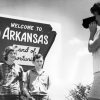
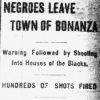
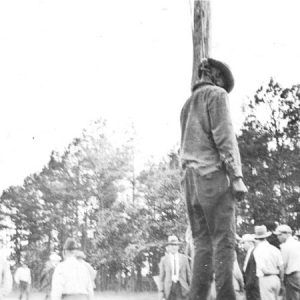
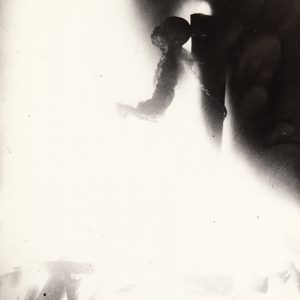
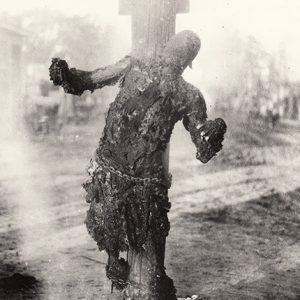
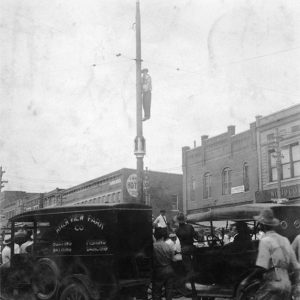
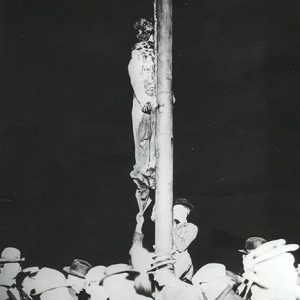
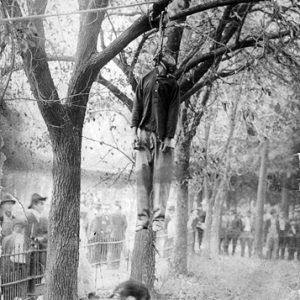
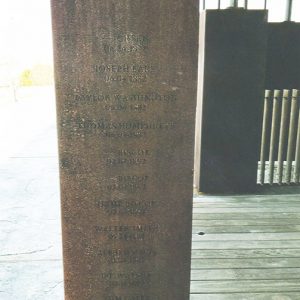
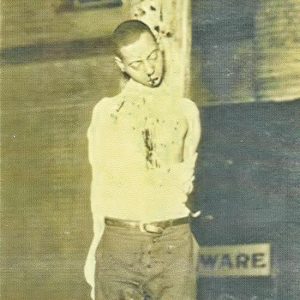




Based on my father’s description of the 1922 lynching of Hunk “Punk” Harris, which he witnessed at age 12. [Editor’s note: Edited for length.] I believe this was the last public lynching in Hot Springs, probably by the Klan. One morning, I started home after selling papers and one of my bike tires went flat. I stopped at a hardware store on Central and several well-dressed young men came in. They ordered pistols and put them in their belts. One said: “We will go down to the city jail first.” I thought it odd, but I dismissed it and walked home. I went back downtown and a large crowd had gathered. I saw a black man standing next to a light pole with his hands tied behind him. Several men with kerchiefs around their faces (not the ones I saw in the store) put a rope around his neck and pulled it tight. The rope was then thrown over one of the heavy wires leading to the light pole. Several men took up the slack and pulled the man up. After he was about three feet off the ground, his legs began to shake. As he was drawn up higher, his head snapped to the side, I suppose when his neck broke. The dead man hung there awhile and then was tied to the back of a flatbed truck. About this time, a Negro ambulance came flying up. Two black men jumped out with a stretcher but were not allowed to take the man. The man in the truck drove away slowly like in a parade, dragging the body. I followed. He headed down Malvern to the black mortuary. He cut the body loose and told the owner to do what he wanted with the body. Why was the man killed? He reportedly killed a white man during a burglary. The police brought blood hounds to sniff the trail down Quapaw to the black section of town. The dogs went directly to the home of the black man. He was found fully clothed under the bed.